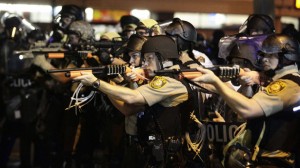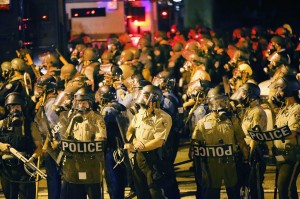I apologize in advance for invoking Godwin’s Law, but as always, Nazism is such the prime historical example of snowballing fascism it’s hard not to bring it up. So I’ll get it out of the way with a brief look at Martin Niemöller’s well known and probably over-quoted poem:
First they came for the Socialists, and I did not speak out—
Because I was not a Socialist.Then they came for the Trade Unionists, and I did not speak out—
Because I was not a Trade Unionist.Then they came for the Jews, and I did not speak out—
Because I was not a Jew.Then they came for me—and there was no one left to speak for me.
We know the poem, and we know the message of the poem is supposed to be “speak out before it’s too late.” But I think a more important message of the poem is that fascism never announces its arrival with jackbooted stormtroopers marching down the town square. It arrives slowly, with the creeping support of legitimate and well-intentioned citizens who desire greater safety, more control and maybe more comfort. Friendly politicians with ambitious plans are far more the province of fascism than angry men with beards. There’s that old nickname the Egyptians had for their dictator of 30 years, Hosni Mubarak, “La Vache Qui Rit,” The Laughing Cow. It’s easier to convince people to surrender their liberties and critical faculties with a smile on your face and a plan to eradicate undesirables in your back pocket. If these undesirables are socialists or trade unionists or Jews, all the better.
It is also a fact of fascism that ideology comes long before cults of personality dominate the scene. We are historically trained to look for dictators who seek to create fascist societies, but if you read the biographies of dictators it is as likely the dictators are created for the society they live in. They fill the power vacuum created by inept government or a weak economy, or they take advantage of scripture which demands a strongman to usher in a god-fearing society. The fascisms of the world today in full force–whether it’s the monarchical fascism in T h a i l a n d or the Islamofascism of Boko Haram or ISIS or Hamas–started as ideologies in need of leadership. We know where to look when we seek out the hot spots for burgeoning fascism: places where ideology trumps individual liberty, or threatens to do so (Zionism certainly falls into this latter category, as does Russian exceptionalism/Putinism and a host of other almost-fascisms).
Which brings me to another quote from author William Gibson:
The future is already here — it’s just not very evenly distributed.
It is this quote that has had me thinking the most since protests and the violent police crackdown erupted in Ferguson last week, and the world has been watching images of our country the way we often look in disbelief at images from oppressive regimes all over the world.
I will for the moment suspend my judgement on what happened in the Michael Brown shooting, because we are always too quick to jump to conclusions about things we don’t know based on what the media has told us. I’m not going to participate in speculation about motives or racism. This is what I care about right now:


I am not in the out group this time. I’m not black, I’m not poor, I don’t live in a place where police suspect me and everyone around me, and I don’t think I’m likely to even commit a petty crime that would get the police called on me in the first place. But I see this picture and the first thing I think is, how hard would it be for those guns to become pointed at me? What laws have I broken that no one knows about yet? What situation in this country could lead for more security such that such scenes become commonplace?
The future is here already, it’s just not evenly distributed.
Despite the fact that most of us remain isolated from this sort of show of force, we’ve known that local police forces in small towns like Ferguson have been acquiring military grade gear for years, including tanks, grenade launchers and assault rifles. And we know that SWAT teams are becoming more and more normal as responses to small crimes, with the inevitable consequences of innocent causalities. And even agencies of our own government are stockpiling ammunition. What does the Department of Homeland Security need with its own military?
The fact that they’re coming for poor black people concerns me, not only because of the wrongness of it on its own, but because I know that somewhere down the line, I’ll be on their target list, too. There’s a long list of types of Americans that other Americans, if they had the means, would love to lock up or outright execute: everyone from petty thieves to looters to drug dealers to the homeless to Muslims to “the 1%” to meat eaters. Do you really want to sit here and take your chances that the police next week don’t have something against you? Especially if we’ve handed them all the tools they need to make your life miserable?
Most Americans are fortunate that we don’t encounter police every day, or situations don’t become tense enough to merit this sort of military presence on our own streets. But we saw during the Boston Marathon Bombing that it takes very little to panic Americans into creating a police state around themselves. And when you create a police shield for yourself, you have to find someone to shield against.
I don’t think the problem is “speaking out.” We all know it’s a problem, and the media–since we have a blissfully free press in this country–has reported constantly on overmilitarization of the police. The problem is despite the fact that we see the images on TV, and we know that one day it’s very possible that our own worlds will be turned upside down by a SWAT raid or a bad shooting in our neighborhoods that tips off a riot or police crackdown, we don’t do anything about it.
And what can we do? Knowing your rights is a good place to start. But what’s the best response as citizens to an omnipresent, obviously growing threat from the police of America to our own freedoms? Should we all buy guns, as people near Ferguson are doing right now? Other than arming and waiting patiently, how do we stop the rising tide of police violence and intimidation in America? Or do we just hope that at some point, our politicians come to their senses and limit their own power? Historically speaking, I don’t think that’s very likely.
I welcome ideas in the comments for immediate, actionable things that citizens can do right now to stop the tide of police militarization in America before we all get swallowed up by it.
 The main theme of Les Miz, for the uninitiated, is redemption, but the story also focuses on the June 1832 Paris uprising, which was a failed one-night rebellion by students against the restored monarchy of Louis-Philippe, a rebellion to which Victor Hugo was clearly sympathetic in his original treatment. The musical has a rousing anthem for the rebellion, “Do You Hear the People Sing,” which makes up the finale, and consequently is being hummed by every audience member leaving the theater. In this anthem, we see the poor and downtrodden people of Paris fomenting revolution, joining forces against the powerful and entrenched elites as they suffer in the street. It is a powerful moment in the film which has the audience on its feet cheering on the people against their oppressors, yet it ends in tragedy as the young students all end up killed at their barricades as the people they hoped to join their movement shutter their windows. The cause of the rebels and what they died for is all but forgotten to history, and would be only a footnote if Victor Hugo hadn’t enshrined it in his book. And we are left thinking about the almost pathetic nature of the failed rebellion; that final moment when the students realized that their brief moment of agitation has resulted in only their own demise.
The main theme of Les Miz, for the uninitiated, is redemption, but the story also focuses on the June 1832 Paris uprising, which was a failed one-night rebellion by students against the restored monarchy of Louis-Philippe, a rebellion to which Victor Hugo was clearly sympathetic in his original treatment. The musical has a rousing anthem for the rebellion, “Do You Hear the People Sing,” which makes up the finale, and consequently is being hummed by every audience member leaving the theater. In this anthem, we see the poor and downtrodden people of Paris fomenting revolution, joining forces against the powerful and entrenched elites as they suffer in the street. It is a powerful moment in the film which has the audience on its feet cheering on the people against their oppressors, yet it ends in tragedy as the young students all end up killed at their barricades as the people they hoped to join their movement shutter their windows. The cause of the rebels and what they died for is all but forgotten to history, and would be only a footnote if Victor Hugo hadn’t enshrined it in his book. And we are left thinking about the almost pathetic nature of the failed rebellion; that final moment when the students realized that their brief moment of agitation has resulted in only their own demise. But the overwhelming weight of history seems to be against violent revolution as a solution to political problems, even when it is successful. In the cases where revolutions have been successful, they have either been regime changes where there was enough popular pressure to dismantle the status quo without much violence, or they have been violent overthrows resulting in a drastically reduced quality of life for the greater society, and often a society very much different than the one intended by the revolutionaries.
But the overwhelming weight of history seems to be against violent revolution as a solution to political problems, even when it is successful. In the cases where revolutions have been successful, they have either been regime changes where there was enough popular pressure to dismantle the status quo without much violence, or they have been violent overthrows resulting in a drastically reduced quality of life for the greater society, and often a society very much different than the one intended by the revolutionaries.